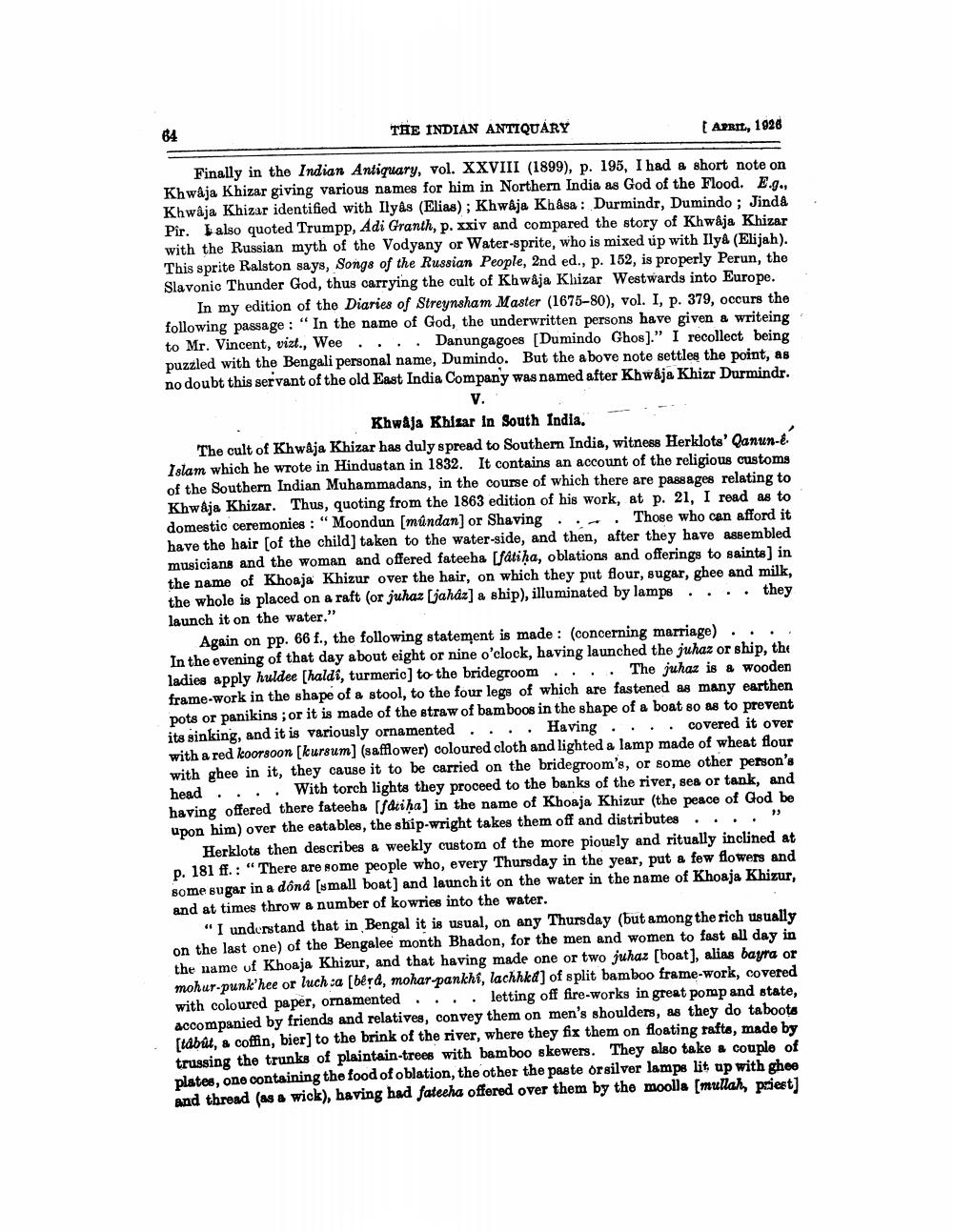________________
THE INDIAN ANTIQUARY
APRIL, 1928
Finally in the Indian Antiquary, vol. XXVIII (1899), p. 195, I had a short note on Khwaja Khizar giving various names for him in Northern India as God of the Flood. E.g., Khwaja Khizar identified with Ilyas (Elias) ; Khwaja Khasa : Durmindr, Dumindo ; Jinda Pir. also quoted Trumpp, Adi Granth, p. xxiv and compared the story of Khwaja Khizar with the Russian myth of the Vodyany or Water-sprite, who is mixed up with Ilya (Elijah). This sprite Ralston says, Songs of the Russian People, 2nd ed., p. 152, is properly Perun, the Slavonic Thunder God, thus carrying the cult of Khwaja Khizar Westwards into Europe.
In my edition of the Diaries of Streynsham Master (1675-80), vol. I, p. 379, occurs the following passage : "In the name of God, the underwritten persons have given a writeing to Mr. Vincent, vizt., Wee... Danunga goes [Dumindo Ghos]." I recollect being puzzled with the Bengali personal name, Dumindo. But the above note settles the point, as no doubt this servant of the old East India Company was named after Khwaja Khizr Durmindr.
Khwaja Khizar in South India. The cult of Khwaja Khizar has duly spread to Southern India, witness Herklots' Qanun-é. Islam which he wrote in Hindustan in 1832. It contains an account of the religious customs of the Southern Indian Muhammadans, in the course of which there are passages relating to Khwaja Khizar. Thus, quoting from the 1863 edition of his work, at p. 21, I read as to domestic ceremonies : "Moondun (mundan) or Shaving.. . Those who can afford it have the hair (of the child) taken to the water-side, and then, after they have assembled musicians and the woman and offered fateeha fatiha, oblations and offerings to saints) in the name of Khoaja Khizur over the hair, on which they put flour, sugar, ghee and milk, the whole is placed on a raft (or juhaz (jaház] a ship), illuminated by lamps.... they launch it on the water."
Again on pp. 66 f., the following statement is made : (concerning marriage). In the evening of that day about eight or nine o'clock, having launched the juhaz or ship, the ladies apply huldee [haldi, turmeric) to the bridegroom .... The juhaz is a wooden frame-work in the shape of a stool, to the four legs of which are fastened as many earthen pots or panikins; or it is made of the straw of bamboos in the shape of a boat so as to prevent its sinking, and it is variously ornamented .... Having .... covered it over with a red koorsoon (kursum) (safflower) coloured cloth and lighted a lamp made of wheat flour with ghee in it, they cause it to be carried on the bridegroom's, or some other person's head ....With torch lights they proceed to the banks of the river, sea or tank, and having offered there fateeha (fatiha) in the name of Khoaja Khizur (the peace of God be upon him) over the eatables, the ship-wright takes them off and distributes...."
Herklots then describes a weekly custom of the more piously and ritually inclined at p. 181 ff.: "There are some people who, every Thursday in the year, put a few flowers and some sugar in a dôná (small boat] and launch it on the water in the name of Khoaja Khizur, and at times throw a number of kowries into the water.
"I understand that in Bengal it is usual, on any Thursday (but among the rich usually on the last one) of the Bengalee month Bhadon, for the men and women to fast all day in the name of Khoaja Khizur, and that having made one or two juhaz [boat], alias bayra or mohur punk' hee or luch -a [bêrd, mohar-pankhi, lachhka) of split bamboo frame-work, covered with coloured paper, ornamented .... letting off fire-works in great pomp and state, accompanied by friends and relatives, convey them on men's shoulders, as they do taboots [tabút, a coffin, bier) to the brink of the river, where they fix them on floating rafte, made by trussing the trunks of plaintain-trees with bamboo skewers. They also take a couple of plates, one containing the food of oblation, the other the paste orsilver lamps lit up with ghee and thread (as a wick), having had fateeha offered over them by the moolla (mullah, priest]




